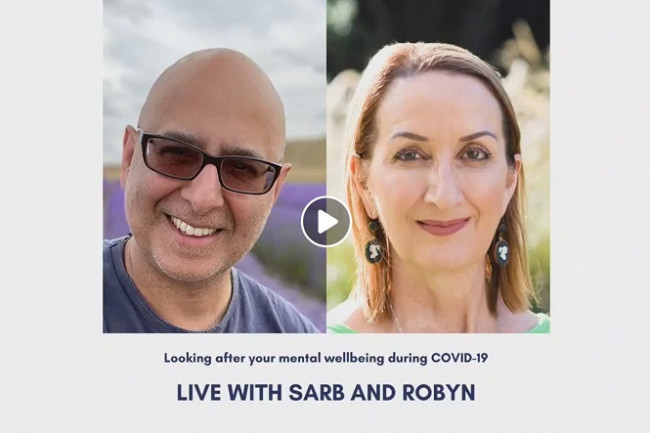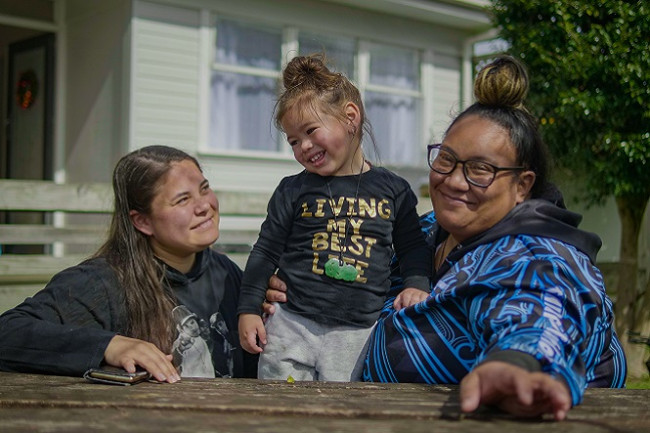Low or no data? Visit zero.govt.nz, scroll down the page then click on our logo to return to our site and browse for free.
COVID-19: Coping with anxiety
Coping with anxiety (manawapā) while COVID is circulating
Key points about COVID-19 and coping with anxiety
- It’s normal to feel anxious about catching COVID-19, especially if you or someone you love is at increased risk of severe illness.
- But there are many things you can do to ease your anxiety.
- Anxiety is a normal human emotion that can even be helpful if it alerts us to threats and helps us take steps to protect ourselves.

Anxiety isn’t just in our heads, it's in our bodies too. Common symptoms of anxiety include:
- difficulty sleeping
- poor appetite
- difficulty focussing
- trouble controlling worrying
- sweating or trembling
- difficulty relaxing, restlessness, tension and nervousness
- hyperventilating, shallow breathing
- increased heart rate
- gastrointestinal (gut) issues
- muscle tension or aches and pains
- a sense of impending doom, danger or panic.
Although these physical symptoms feel awful and are distressing, they won’t harm you in the short-term. If you're able to let these feelings flow through you and past you, rather than resisting and fighting them, they will ease.
Learn more about anxiety and how to manage it. Here is information about more anxiety topics.
Anxiety is a normal and expected reaction to the pandemic, but ongoing anxiety can become harmful. Feeling stressed and fearful every day takes a toll on health and wellbeing very quickly. People who already experience a lot of anxiety may find their anxiety getting worse and find themselves less able to cope.
Here are some signs that your anxiety is becoming harmful and that you would benefit from support:
- You can't think about anything other than things related to the pandemic.
- Most of your pandemic thoughts end up with worst case scenarios.
- Your anxiety interferes with your daily life eg, you have trouble going to work or focussing on work, or you struggle with things you used to manage like going out in public or having conversations with friends.
- You want to isolate yourself.
- You feel hopeless or angry in general.
- You feel jittery and amped up all the time.
- You are not eating or sleeping well.
- You experience physical symptoms like frequent headaches or an upset stomach.
If you're worried about the way anxiety is affecting you, look at the support options below.
Feeling anxious and uncertain about the future breeds hopelessness and a sense that things, including COVID-19, are out of your control. But there are many things you can do to ease your anxiety. 
Image credit: Pixabay
Don’t avoid your anxiety
Some people deny they are feeling anxious and distract themselves with food, alcohol or TV. But avoiding your anxious thoughts never works. Accepting and facing anxiety reduces it over time. Here's a brief list of things you can do to get there.
Take care of the basics
Anxiety affects us physically as well as mentally so it helps to take care of the basics.
- Eat well: Being anxious uses a lot of energy so it's important to eat healthy food – even if you have a reduced appetite.
- Exercise: Exercise is possibly the most effective tool to reduce the stress hormones circulating in your body. Any sort of exercise (including gentle walking) will help and the more regular the better.
- Keep your mind active: When your mind is engaged it is more difficult for anxiety to take hold.
- Be in nature: Being outdoors is soothing for the nervous system.
- Make time for hobbies: Doing things you enjoy is a useful method of distracting yourself from anxious thoughts and can lift your mood.
- Get enough sleep: Sleep is vital to wellbeing. Here are some sleep tips.
Set a routine
When things feel out of control a routine helps provide structure and makes things calmer. If you sleep and eat at random times, things start to feel chaotic, and anxiety can get worse.
- Get up and dressed at roughly the same time each day.
- Set a time for exercise and your other commitments.
- Stick to your routine as much as you can.
You're more resilient than you think!
Anxiety makes us overestimate how bad things are likely to be. We also tend to underestimate how well we'll cope, but most people cope better than they think they will. So keep telling yourself how well you've coped in the past and know that you are more resilient than you think.
Stay connected with whānau and friends
It's easy to get isolated when working or studying from home and thoughts become more and more powerful when we are alone. Anxiety can spiral out of control. Take steps to reduce your isolation which can help ease your anxiety.
Find ways to help others
Anxiety can make you more self-focused but reaching out to support others instead breaks this cycle and feels good. Make it a habit to check on friends, neighbours and whānau who are more vulnerable and ask if they need anything. You will be helping them and yourself at the same time.
Look after the people around you
Your tamariki may also be anxious, especially if they see that you are worrying. These tips are specifically to help kids cope with anxiety.
Seek out positive people
We tend to catch emotions from the people around us – both positive and negative. Seeking out people who are grounded and level-headed can help improve mood.
Be kind to yourself
You don’t have to listen to all the mean and negative messages in your head. Just because they seem true doesn't mean that they are. Anxiety is never logical and very rarely accurate. Practise talking to yourself kindly, as you would talk to a good friend. Keep this up even when you are anxious.
Mindfulness and prayer
Mindfulness and prayer are very useful techniques to lessen anxiety. Here's what you need to know about mindfulness to get started.
Breathing
Another good way to reduce anxiety is to learn to manage your breathing. Being anxious makes us breathe more shallowly. This makes your brain think you're not getting quite enough oxygen. Interrupting this cycle will make a huge difference. Practicing is important to get results.
If you feel yourself spiralling into negativity or panic, here's a simple but effective technique. It involves your breath and your body and focussing your attention on the here and now while slowing your breathing until you feel calmer.
List to yourself:
- 5 things you can see
- 4 things you can hear
- 3 things you can touch
- 2 things you can smell
- 1 thing you can taste.
Try practicing this when you are not feeling anxious so you are prepared when you need it.
Limit media coverage
Constant media coverage can increase the sense of danger surrounding the COVID-19 situation. It's important to be informed but too much media can take a toll on your mental health. If the news is one of your anxiety triggers, limit COVID-19 news coverage. Also, make sure you only get news from reliable sources.
Only try to control what you can control
Anxiety can make us feel powerless. It's important to figure out what you can control and what you can't. Taking action is empowering but trying to manage things outside of your control is throwing energy away and will heighten your anxiety. Things in your control could include making sure everyone in your whare/home has a mask and you have a supply of food, necessary medicines and cleaning products.
“What ifs” are dangerous
"What if" questions can lead to worst case scenario thinking. If you often find yourself asking them, go back to the grounding techniques (using breathing and what you can feel in your body) and carefully re-visit your questions when you're feeling calmer.
Try a mobile app
There's a variety of excellent apps to assist with managing anxiety. Take a look at these anxiety apps for COVID-19.(external link)(external link)
COVID-19 positive?
If you're COVID-19 positive, you may be feeling very anxious. Read about how to look after your mental wellbeing.
Video: Looking after your mental wellbeing during COVID-19
Robyn Shearer and Dr Sarb Johal talk about how to support your mental wellbeing while dealing with COVID-19. This video may take a few moments to load.
 (external link)(external link)
(external link)(external link)
(Ministry of Health, NZ, 2020)
Keeping busy with crafts, music and games helps with anxiety
Partners Erana Thompson and Alyssa Graham were both afraid of catching COVID and sometimes anxiety and lockdowns got the better of them.
The Papakura couple had a small baby when COVID first hit and Erana says that made her feel especially anxious.
“We didn’t want baby to get sick,” Erana remembers.

Image credit: Erana Thompson, Te Amo and Alyssa Graham
At one point Erana thought she was having a heart attack and she went to hospital fearing for her life.
“But it was a panic attack – I wasn’t having a heart attack!”
She wondered a lot if her anxiety was normal or not: “It was pretty scary and it took me a while to be able to control the attacks or find things to help me to control those.”
She knew plenty of people experienced anxiety but perhaps not everyone understands that it is common and normal when life gets tough, as it did for her family.
Plenty to do to get through
She wants to reassure others there are plenty of things you can do to get through the tough times. The things that really made the most difference for her was keeping busy with her crafts, playing music, singing karaoke with Alyssa and Te Amo, playing card games and being with her whānau.
She says her mum helped her a lot to get through: “Like breathing techniques, little things like tapping to bring down my heart rate. I used things like weaving korowai and playing cards, karaoke, anything like that to distract my mind.”
When Alissa caught COVID in August 2022 it was a shock and they didn’t know what to think or how to react.
“We pretty much just panicked,” Erana recalls. “She was in the kitchen bawling her eyes out, and I was in the lounge bawling my eyes out.”
Alyssa said she panicked that their baby was going to get sick, or Erana or the kids she worked with.
“I didn’t want to be responsible for that. But when I got my head around it we let people know and [my employer] got in touch with Papakura marae and they contacted support services who rang us all week.”
Alyssa was also worried for herself because she has 3 long-term conditions, including asthma, and she knew that was a risk factor for people with COVID.
Community support amazing
Turned out she wasn’t too sick at all, and says the flu was worse. The support from the community at that time was amazing, she adds. For example, her doctor’s clinic employs a COVID nurse who would ring her every day to check she was okay and the clinic sent care packages, as did many other people.
“She rang me every day and [took care] of all my medications” Alyssa says.
“And we had so much food we shared some with whānau. It was awesome” Erana adds.
The experience, they agree, has given them a lot of strength.
“It’s definitely helped not being in lockdown anymore because you feel a sense of normality. I can go out and not be so scared” Erana says.
Alyssa says her mother-in-law has been a great support all through COVID and they couldn’t have done it without whānau and others helping out.
Video: Keeping busy with crafts, music, games to help with anxiety
This video may take a few moments to load.
(Healthify NZ and Te Whatu Ora | Health New Zealand, Waitematā, 2022)
View descriptive transcript in English [PDF, 183 KB]
View transcript in Cook Islands Māori
View transcript in Niuean [PDF, 147 KB]
View transcript in Tokelauan [PDF, 146 KB]
Resources
The anxiety New Zealand helpline(external link)(external link) is confidential, free and available 24/7. Call 0800 269 4389 (0800 ANXIETY)
Living with worry and anxiety amidst global uncertainty(external link)(external link) is a practical guide for managing anxiety
How you can help guide(external link)(external link) for helping people with anxiety or mental health concerns
Coronavirus(external link)(external link) resources and information on COVID-19 and mental health, UK
What is Wellbeing?(external link) from the Mental Health Foundation, NZ
Te Hikuwai – anxiety(external link)(external link) resource for understanding and managing anxiety, NZ
FACE COVID – how to respond effectively to the corona crisis(external link)(external link) with practical steps
References
- How teenagers can protect their mental health during COVID-19(external link) unicef for every child
- Living with worry and anxiety amidst global uncertainty(external link) Psychology Tools, 2020
- Dubey S, Biswas P, Ghosh R, et al. Psychosocial impact of COVID-19(external link) Diabetes Metab Syndr. 2020 Sep-Oct;14(5):779-788
- COVID-19 and anxiety(external link) Canadian Mental Health Association, Canada, 2021
- How you can help – a guide for friends and family(external link) Rethink Mental Health, UK
- Coping with coronavirus anxiety(external link)(external link) Australian Psychological Society, Australia, 2020
- Gouzman J, Soskolne V, Dekel R. Framing the meaning of COVID-19 and the psychological responses to it – Insights gleaned from selected theoretical approaches(external link) J Health Psychol 2022 online
- Gasteiger N, Vedhara K, Massey A, et al. Depression, anxiety and stress during the COVID-19 pandemic – results from a New Zealand cohort study on mental well-being(external link)(external link) BMJ
Credits: Healthify editorial team. Healthify is brought to you by Health Navigator Charitable Trust.
Page last updated:





